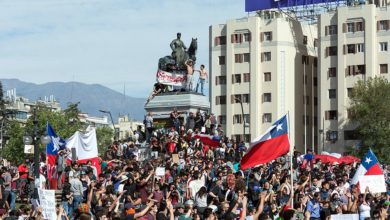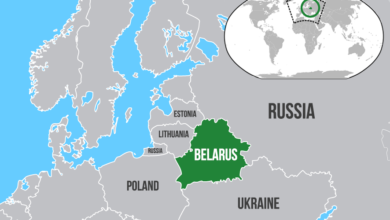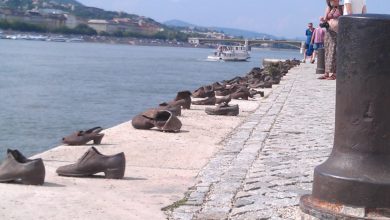The Party for Socialism and Liberation stands in solidarity with the victims of the massive violence carried out by the police forces of the Spanish state against residents of the Autonomous Community of Catalonia who were attempting to exercise their right to vote in a referendum on independence. This wave of repression left over 800 people injured. Nevertheless, 42 percent of the Catalan electorate — nearly 2.3 million people — managed to vote, and over 90 percent of those participating voted “Yes.”
While there is no consensus among the people of Catalonia on the issue of independence itself, the extreme and brutal response of the central government in Madrid has united Catalans and many others across the Spanish state in opposition to the right-wing administration of Prime Minister Mariano Rajoy. The principle issue has in many ways become democracy itself — do Catalans have the right to vote and decide their future for themselves?
Catalan national sentiment is often traced back to the end of the War of Spanish Succession in the early 1700s, but much fresher in the minds of the Catalan people is the experience under the fascist regime of Francisco Franco, who ruled the country from the end of the Spanish Civil War in 1939 until his death in 1975.
During the 1936-1939 civil war, Catalonia was a bastion of left-wing resistance to Franco’s forces. Once the fascists consolidated their power over the whole country, it became a crime to speak the Catalan language and pro-independence forces in Catalonia were subjected to vicious persecution. Much of the anti-referendum repression of the past days was carried out by the Civil Guard, an infamous institution that was an important pillar of the Franco regime.
While the Spanish constitution of 1978 marked the formal end of fascist rule and instituted a multi-party electoral system with a ceremonial monarchy, it did not thoroughly uproot Francoism from the state apparatus and maintained many of the oppressive aspects of the old regime. Although Catalonia gained significant autonomy during the “transition to democracy,” the 1978 constitution does not afford Autonomous Communities like Catalonia the right to secede. It is this anti-democratic provision that the Rajoy government is using as a pretext to crack down on the referendum.
Class struggle and the right of self-determination
The right of oppressed peoples to self-determination is a core principle for socialists. The subjugation of whole nations is a main aspect of the development of capitalism. In order to plunder resources, labor and markets, capitalist states have subjected peoples around the world to absolute political tyranny while seeking to eradicate cultural and linguistic traditions.
We view self-determination as an essential condition for genuine unity among working people of all nationalities, which in turn is an essential condition for the overthrow of capitalism on a global scale.
In his 1914 pamphlet “The Right of Nations to Self-Determination”, Bolshevik leader Vladimir Lenin wrote:
“The reactionaries are opposed to freedom of divorce; they say that it must be ‘handled carefully’, and loudly declare that it means the ‘disintegration of the family’. The democrats, however, believe that the reactionaries are hypocrites, and that they are actually defending the omnipotence of the police and the bureaucracy, the privileges of one of the sexes, and the worst kind of oppression of women. They believe that in actual fact freedom of divorce will not cause the “disintegration” of family ties, but, on the contrary, will strengthen them on a democratic basis, which is the only possible and durable basis in civilised society.
“To accuse those who support freedom of self-determination, i. e., freedom to secede, of encouraging separatism, is as foolish and hypocritical as accusing those who advocate freedom of divorce of encouraging the destruction of family ties. Just as in bourgeois society the defenders of privilege and corruption, on which bourgeois marriage rests, oppose freedom of divorce, so, in the capitalist state, repudiation of the right to self-determination, i. e., the right of nations to secede, means nothing more than defence of the privileges of the dominant nation and police methods of administration, to the detriment of democratic methods.”
The national struggle does not, however, supersede or put on hold the class struggle. The nation-state itself is a product of the struggle of the capitalist class against the feudal lords of Europe. The bourgeoisie sought to centralize many small, atomized principalities into new entities such as Germany and Italy in order to provide a secure footing for their rule.
In the 20th century, in large parts of Africa, Asia and Latin America the struggle for national self-determination against imperialism and the struggle for socialism became effectively fused as revolutionary forces became the dominant wing of the anti-colonial movement. On the other hand, in places like the former Yugoslavia it is clear that secessionist movements can also be used to assert imperialist hegemony.
Therefore, there can be no timeless and universal approach to the national question derived from the “classics” of Marxism. Each individual situation needs to be analyzed in the context of its historical development.
Carles Puigdemont, the leader of the Catalan Autonomous Community, is a conservative and a member of the right-wing Catalan European Democratic Party. It participates in a coalition called “Together for Yes” with the social democratic Republican Left of Catalonia (ERC).
The pro-independence section of the capitalist class has a clear international orientation towards the U.S.-dominated world order and the European Union. Catalan right-wing nationalists have made clear their favorable disposition to the NATO military alliance.
Although approximately 16 percent of the Spanish state’s population lives in Catalonia, it is responsible for about 20 percent of the country’s economic output. This is the fundamental basis on which a section of the Catalan capitalist class supports independence. The bourgeoisie of Catalonia wants to stop, as they put it, subsidizing the rest of Spain and grow even richer without being impeded by the Madrid government.
However, there is also a substantial section of the Catalan independence movement that is pro-socialist in character. The primary organizational expression of this is the Popular Unity Candidacy (CUP), which supported the referendum and called for a “free, independent and socialist republic” to be formed.
Because of the prominence of bourgeois forces in the pro-independence camp, much of the left in Catalonia and Spain supports the right to vote on the question but is opposed to secession itself.
Podemos, which emerged from the 2011 “movement of the squares” protests that were a precursor to the Occupy movement in the United States and is now the largest left-wing party in Spain, has this orientation. Podemos leader Pablo Iglesias and Xavier Domènech, head of Podemos’ Catalan sister party wrote in July:
“Corruption and the plundering of the public sphere, the norm of government of the old ruling parties in both Spain and Catalonia, are the clearest expression of the crisis of popular sovereignties. Corruption and the plundering of the public sphere are, in fact, the main threat to popular sovereignty and without popular sovereignty there can be no national sovereignty … In our opinion, [the referendum on] October 1 is taking shape more as a vast mobilisation in favour of the right to decide and as an expression of the desire for sovereignty … That is why the October 1 mobilisation can be an act of affirming rights and sovereignty in the face of a situation that must be unblocked, given the PP’s [the party of Prime Minister Rajoy] categorical failure and its repressive tendencies. In this sense, we assert the legitimacy of October 1 as a political mobilisation and support its taking place. However, afterwards comes October 2 and work will have to continue for a referendum that must engage everyone and where nobody might feel invited to stay at home.”
The Communist Party of the Peoples of Spain issued a statement on the day of the referendum that stated:
“The PCPE [Communist Party of the Peoples of Spain] has spoken clearly about the political basis of the Catalan conflict and the proposals that the working class needs in order to get out of the false dichotomies in which nationalism seeks to trap it. We have said that the road of independentism is not useful for achieving self-determination in Catalonia. But while we try to get the working class to choose its own way, we believe that all those Catalans who wanted to express themselves through the vote had the right to do so without having to face police charges. The actions of the State aimed at preventing the vote, especially those of a police nature, have all our rejection.”
As part of a debate with prominent Popular Unity Candidacy member Pau Llonch, Alberto Garzon, the leader of the Communist Party-led United Left alliance which supports the right to decide but not secession, wrote:
“[I]s the referendum the best way to break with the regime [that currently rules Spain]? … The problem is that, to begin with–even assuming that this is the best way to break with the regime (which I do not believe, since the regime exists to defend a mode of production and a power structure that would not necessarily be altered by the mere existence of more states)—this is not our way. That is, we do not control any of the parameters of that break: anything could happen and nothing is decided in advance. Would the comrades of the CUP manage the post-independence scenario, or would the Catalan right wing lead it?”
Pau Llonch replied in defense of the Popular Unity Candidacy position:
“We defend concrete potentialities, you defend abstract alternatives. Since you ask for concrete analysis, an alternative in the strictly institutional sphere with a chance of being hegemonic in a Catalan Republic already exists: it is the sum of Catalunya en Comú [one of the principle Catalonian left-wing formations], the ERC and the CUP. Note that we can allow ourselves to leave the PSC-PSOE [neoliberal ex-social democrats] out of the equation, unlike what can be proposed at the level of the Spanish state. Of course, this does not guarantee the eventual building of socialism in Catalonia, because that will depend, as always, on what happens on the streets rather than in the institutions, but it does offers an opportunity—very concrete—to continue fighting for possible alternatives in the current phase of post-crisis capitalist restructuring in the absence of totally antagonistic institutions, in a contest between honest social democracy (Catalunya en Comú and the ERC) and socialism (the CUP): that could be an example for many peoples in the Spanish state and on the European continent … There is no alternative to democratic resolution of this conflict, and no democratic resolution is possible within the Kingdom of Spain. The constitution of 1978 was erected on three pillars: capitalism as mode of production, the monarchical system and denial of the right of self-determination to the peoples of the State.”
In other words, the Popular Unity Candidacy believes that there is a clear left-wing majority in Catalan society, and unlike in the rest of Spain a left-wing government would not need to include the morally bankrupt and misnamed Socialist Workers Party of Spain (PSOE). This, they argue, is a much more favorable environment in which to conduct the struggle for socialism than the framework of the thoroughly reactionary Spanish state.
In the election for the Catalan regional parliament in 2015, the big tent pro-independence coalition Together for Yes came in first place, but did not secure a majority. After extensive internal debate, the Popular Unity Candidacy finally decided that it would use its votes in parliament to allow Together for Yes to form a regional government for the purpose of organizing an independence referendum. But in return the bourgeois nationalists had to choose someone other than the widely-hated and corrupt President Artur Mas to lead Catalonia.
Surge of opposition to reactionary Rajoy government
The sheer brutality of the Rajoy government in Madrid, both in the lead-up and during voting, has backfired. The anti-referendum hardliners have become increasingly isolated, and the police crackdown has had a unifying effect on progressive forces throughout the Spanish state.
Ada Colau, left-wing mayor of Barcelona, helped facilitate the referendum even though she herself cast a blank ballot. She condemned the police attacks on voters, saying “As mayor of [Catalonia’s capital] Barcelona I demand an immediate end to police charges against the defenseless population.”
Prime Minister Rajoy’s People’s Party and their right wing allies in the Citizens party hold a minority of seats in the Spanish legislature. For their parliamentary majority, the right wing relies on the center-left PSOE, which does not participate in the government but allowed it to be formed.
After it became clear that the wave of police violence on the day of the referendum had resulted in hundreds of injuries, center-left leader Pedro Sanchez criticized the Rajoy government, urging it to pursue “peaceful coexistence, not confrontation” and supporting “opening a political negotiation channel that is more urgent than ever.” The Catalan referendum has done significant damage to the cohesion of the ruling reactionary bloc in Spanish politics and even raises the possibility of a no-confidence vote to bring down Rajoy.
The degree to which the Madrid government’s dictatorial attitude has boomeranged was on full display on October 3, when hundreds of thousands of people marched across Catalonia as part of a general strike that was called to protest the police repression that took place two days prior. Large sections of the economy were shut down as workers walked off the job and hit the streets in a massive display of defiance.
The opportunities for revolutionary struggle can be seized and the pitfalls of reactionary nationalism can be avoided only if Catalans are free from the oppressive boot and baton of the Rajoy government and its fascistic police.





